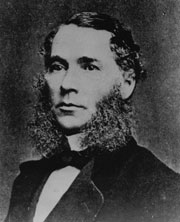Please check back later for more on this topic.
Please check back later for more on this topic.
Please check back later for more on this topic.
Please check back later for more on this topic.
Please check back later for more on this topic.
Please check back later for more on this topic.
Samuel Preston Moore, Confederate Surgeon General

Samuel Preston Moore, n.d.
Samuel Preston Moore was born in Charleston, SC, in 1813 and graduated from the
Medical College of the State of South Carolina in 1834. He moved to Little Rock,
Arkansas, where he practiced briefly before being appointed assistant surgeon in the
United States Army in 1835. During his time with the US Army, Moore served at posts
in Florida, Iowa, Kansas, and Missouri. While serving in Texas during the Mexican War
(1846-1848), Moore met Jefferson Davis, future president of the Confederacy. At the
end of the Mexican War Moore returned to Missouri where he was promoted to surgeon
with the rank of major in April 1849. Between 1849 and 1860, Moore served in Oregon,
Texas, New York Harbor, and West Point.
When South Carolina seceded from the Union, Moore resigned his commission as
surgeon in the US Army and returned to Little Rock to open a private practice. Soon
after returning to Arkansas Moore began receiving requests from Jefferson Davis to join
the Confederate army. In his correspondence to Moore, Davis described the deplorable
conditions caused by the overwhelming number of casualties and a lack of Southern
physicians trained in military medicine. Moore accepted the position of acting surgeon
general on July 30, 1861 and was confirmed by the Confederate Senate in November of
that same year.
Among the more notable achievements of his tenure as surgeon general was the
organization of the Confederate Medical Department, the establishment of examining
boards for surgeons and assistant surgeons, the construction of military hospital huts, or
one-story pavilion hospitals, and the establishment of drug, hospital supplies and surgical
instruments factories around the Confederacy to supply the Army's needs. Moore also
directed the recruitment of Army surgeons, and commissioned two ground-breaking
resources for Confederate military medicine: JJ Chisolm's Manual of Military Surgery and FP Porcher's Resources of the Southern Fields and Forests. After his service in the
war, Moore settled in Richmond, Virginia where he died on May 31, 1889.